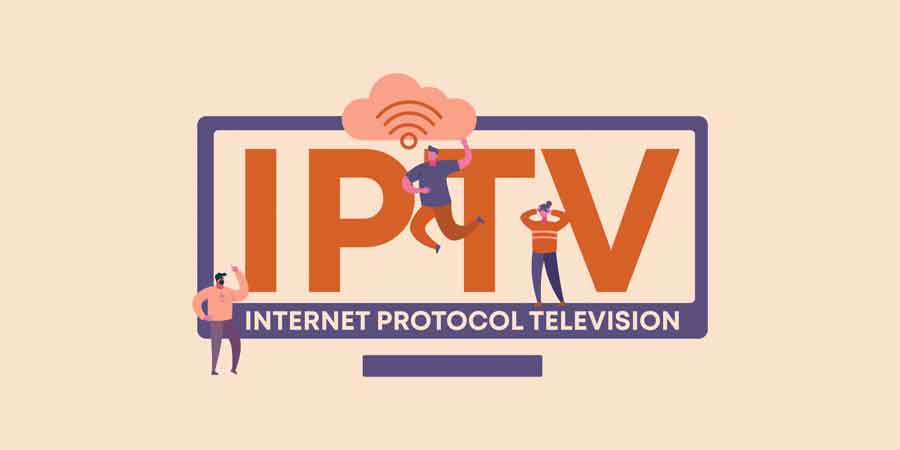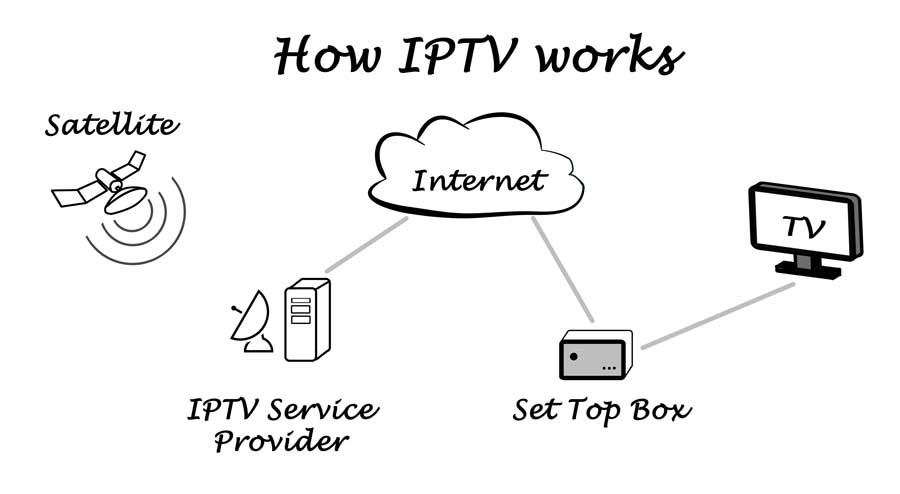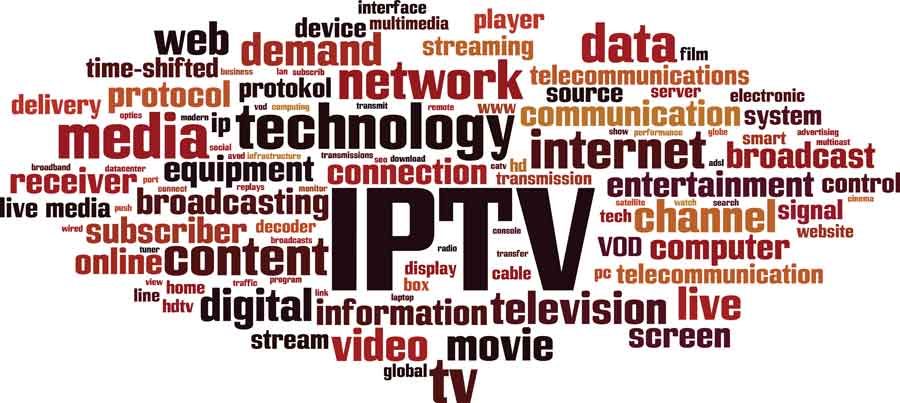Last Updated on January 29, 2024 by Tim Wells
Even if you’ve been streaming movies and TV for years, you may be confused about IPTV (Internet Protocol Television). You might even understand the concepts of “IP” and “TV” separately, but just not how they work together.
It’s understandable to be confused. There’s a lot of misinformation about accessing IPTV services and whether it’s legal.
This article will walk you through what IPTV is in simple terms. By the time you reach the end, you’ll know what IPTV is, and how you can use it.

What is IPTV (Internet Protocol Television)?
IPTV stands for “Internet Protocol Television,” and its an alternative to cable or satellite TV.
Let’s break that down:
You may be familiar with IP addresses. They are an identifying address assigned to every device connected to any network that uses that Internet Protocol.
With someone’s IP address, you can typically narrow down their location and figure out who their Internet service provider (ISP) is. Those providers can also use IP addresses to identify people who might be illegally downloading content online, among other reasons.
TV, of course, is something that most people are familiar with.
Over-the-air (OTA) cable TV was once the standard. You received a signal to your satellite, antenna, or even directly to your TV that allowed you to watch live TV channels, including your local news, favorite sitcoms, and more.
More recently, digital transmissions have become the norm. And you might have enjoyed TV service from your cable company through fiber optic cables.
These days, with a fast Internet connection, more people are cutting the cord. It’s possible to watch your favorite movies or find new video content online.
Even if consumers had fewer options, they recognized that it was a better deal to pay Netflix, Amazon, or Hulu than their local cable or satellite TV company. Video game consoles, smart TVs, and streaming devices replaced OTA TVs.
What does this all have to do with IPTV?
Every streaming service is a form of IPTV, streaming content to your TV screen or connected device using the IP protocol, just like a web page.
Even if you weren’t familiar with the term before, you’re likely one of the millions of people who have used IPTV services already.

How Does IPTV Work?
IPTV services work differently depending on how they broadcast. Some IPTV services offer more than one option, while others may only focus on one.
Let’s talk about each one.
Video on Demand (VOD)
Video on Demand, or VOD, is the most common type of IPTV broadcast.
VOD is similar to Netflix or Disney+ in that you get to watch specific content whenever you want. Behind the scenes, the IPTV service transcodes TV signals to ones that your streaming device can understand, often without paying a subscription fee.
This might seem too good to be true, and it could be if the IPTV services don’t have the right to broadcast that content.
However, many traditional TV services have gone this way because it’s a great way to attract new viewers.
Examples of the most famous legal video-on-demand services are Amazon Prime Video, Hulu, and Netflix.
VOD is similar to DVR (time-shifted) content, allowing you to watch content after it’s been aired live.
Live Broadcasting
Next up is live broadcast TV, a type of IPTV similar to your local news report or Monday Night Football on ESPN.
You log in at a specific time to catch live TV channels, usually getting TV programs directly from the source rather than a third party.
Internet Simulcasting / IP Casting
Finally, we have a category with a few names: live internet simulcasting, IP casting, or live IP.
IP Casting is streaming content by someone other than the source, and it can be completely legal if the IPTV service has licensed the content.
Pluto TV is one example of legal live IPTV providers that offer on-demand video. It’s actually owned by Viacom, which has contracts for content usage and relies on ads that keep the IPTV service free to users.
Hybrid IPTV
A lesser-known type of IPTV is something called “hybrid IPTV.” This combines traditional TV with IPTV in a single set-top box.
The IPTV part of that service is similar to sources you might use on your streaming device, Kodi box, or computer.
Is IPTV Legal?
IPTV apps and clients are absolutely legal, since they do not provide any copyrighted content. The platform would allows the user to play whatever content they choose.
The key question here is whether the content providers are legal. To many people’s surprises, lots of content providers nowadays are willing to show their content for free. For example, many of the fox channels are available on their official app Tubi. With the right address, you could also use a cleaner IPTV client such as Tivimate to watch the content from Tubi legally.
Many could be concerned about the third party providers. As long as the third party service is willing to pay enough money, they could obtain your favorite TV show’s rights.
However, if they can’t reach an agreement, the rights expire, or the content owners would prefer to put it on their own streaming service (like HBO Max or Disney+), you might not be able to find the desired content.
Sometimes, you end up with the infamous 2013 deal where Dodgers fans living in Southern California couldn’t watch their team’s games because of a contract dispute with Time-Warner Cable (Spectrum).
If consumers can’t find a way to watch the content they want, they may start considering IPTV services that may not be entirely legal.
Legality in United Kingdom
The UK passed the Digital Economy Act in 2017, which increased the penalties for anyone who violates the intellectual property rights of others.
The Digital Economy Act 2017 (DEA) is a law that aims to modernize and improve the UK’s digital infrastructure and services. One of the provisions of the DEA is to create tougher punishments for anyone who commits or facilitates copyright infringement online.
According to the DEA, people could be guilty of an offence and can face up to 10 years in prison, if they infringes copyright by making available to the public a work that they do not own or have permission to use, or communicating to the public a work that they do not own or have permission to use.This applies to both individuals and businesses who upload, stream, download, or share unauthorized content.
The DEA also gives more powers to the courts and law enforcement agencies to deal with online piracy. For example, the courts can order internet service providers (ISPs) to block access to websites that facilitate or promote infringement, or to disclose the identity and location of infringers. Law enforcement agencies can also seize and destroy any devices or equipment used for infringement.
However, no one has been charged for simply watching illegal IPTVs yet, as the law has mainly targeted the people who run these services. Police have sent mass warnings to some suspected illegal IPTV users, saying they could face legal consequences if they did not stop using them. IPTV services may try to hide their illegal activities, but law enforcement and Internet service providers can track, monitor, block or shut down illegal IPTV websites and servers. Therefore, it is important to verify the legality of IPTV services yourself.
Legality in United States
The DMCA, which was enacted in 1998, is the main law that deals with online piracy in the US. It imposes fines and penalties on anyone who distributes unauthorized content on the internet without a valid license. However, streaming was not fully covered by the DMCA, as the law only applied to downloads.
This gap was recently closed by the Protecting Lawful Streaming Act, which was included in a large COVID relief bill that was passed in December 2020. It makes it a serious crime to illegally stream copyrighted material online for profit or gain. The law is aimed at the people who run or offer illegal streaming services, not the users who watch them. The law can punish the offenders with up to 10 years in prison.
Unfortunately, it’s often hard to tell whether an IPTV provider is above board or not. To avoid legal issues, try to verify the legality of your source, and always use VPN services such as SurfShark.

Examples of 100% Legal IPTV Services
You probably already know about some of the most popular IPTV services. Several are even owned by the biggest names in telecommunications.
Pluto TV was already mentioned above, which is available on several streaming devices and requires no configuration.
Xumo is similar, offering both live TV and VOD. It’s owned by telecom giant Comcast, so you don’t have to worry about the legality or how long the service will last.
BBC’s iPlayer includes the channels BBC One, BBC Two, BBC Three, BBC Four, BBC News Channel, and CBeebies. It’s restricted if you live outside of the United Kingdom. Still, many people get around that by using a VPN like IPVanish.

FuboTV
For sports fans wanting to cut the cord, FuboTV is an attractive choice. It boasts robust national and international sports coverage, featuring notable channels such as CBS, FOX, Golf Channel, NBA TV, NBC, NFL Network, TBS, TNT, beIN Sports, Fox Deportes, GOL TV, TUDN, and ESPN.
While it caters primarily to fans of various sports, FuboTV also offers access to a range of entertainment channels.
Access FuboTV via the web or dedicated apps for multiple platforms, with options for streaming on three to ten devices. Expect live streams at 720p, 4K streaming for selected content, and on-demand viewing in 1080p.
Start your free trial with FuboTV today.

Sling TV
Sling TV distinguishes itself by splitting sports coverage across its Orange and Blue plans. The Orange plan includes ESPN, while the NFL Network and NBC Sports are part of the Blue plan. You can further expand your sports coverage with the Sports Extra add-on.
Sling TV is suitable for viewers wanting customizable streaming packages. However, it has weak local channel coverage, lacks CBS or local ABC affiliates, and offers limited Regional Sports Networks (RSNs).
Simultaneous streaming is also plan-dependent, with one stream for Orange, three for Blue, and four for a combined plan. DVR storage comes with 50 hours in the base plan, expandable to 200 hours.
You can access Sling TV on mobile, streaming devices, Xbox consoles, and the web.

ESPN+
ESPN+ offers daily live sports events from various leagues, including MLB, NHL, national and international soccer, NCAA, and UFC (PPV). It’s excellent for cord-cutters seeking alternative live sports content and access to ESPN’s archives.
However, note that ESPN+ does not include streams of ESPN’s Monday Night Football broadcasts or live NBA coverage.
Accessible through the web and the ESPN app on various platforms,
Even YouTube offers its own live options, with TV channels such as HGTV, TNT, and Nickelodeon on the lineup. However, it’s not free.
Whether you love British drama, anime, Disney movies, sports, or comic movies, you’ll find an IPTV service that fits your style.
In fact, many streaming services now offer optional packages that give access to niche and live content. That means you don’t have to sign up for a separate service.
Many services appeal to consumers by offering some free content. If you look directly at services from TV channels like CBS or The CW, you’ll find apps that provide a mix of free and paid content.
It’s a bit difficult to recommend other IPTV services because new ones pop up all the time. Others go down because they’ve run into issues with the law, Internet providers, or ad buyers.
Best IPTV clients for Android TVs
The clients themselves are legal, but please be aware of your content source:

- Tivimate
Tivimate is a modern and clean app for IPTV. You can enjoy your favorite shows, sports, news, and entertainment on your TV, phone, tablet, or computer with TiviMate. TiviMate has a modern user interface designed for big screens, and it supports multiple playlists, scheduled TV guide update, favorite channels, catch-up, search, and more. TiviMate does not provide any TV sources, so you need to add a playlist from your IPTV provider to be able to watch live TV channels. TiviMate has a more modern and intuitive user interface designed for big screens. TiviMate also supports picture-in-picture mode, which IPTV Smarters Pro does not.

2. IPTV Smarters Pro
IPTV Smarters Pro is another popular video streaming player that allows you to watch live TV channels, VOD, series, and TV catchup from your IPTV provider on various devices. IPTV Smarters Pro supports more content sources than TiviMate, including live TV, VOD, series, catch-up, and web series. TiviMate only supports live TV and VOD. IPTV Smarters Pro also supports M3U file and URL loading, while TiviMate only supports M3U playlists.
Using IPTV on Kodi
If you like Kodi and use it regularly, IPTV can make it even better. Although you can always install a TV tuner to get OTA (Over The Air) signals, an IPTV service may be a better option, depending on where you live.
First, you can install an IPTV add-on to enjoy live TV and video on demand directly within Kodi. These add-ons may or may not be legal, depending on where you get them.
IPTV add-ons for Kodi will only work if you have an account with the service and configure the add-on. Some may require you to install an additional plugin to make them work.
The second option is to buy a fully-loaded Kodi box.
A “fully loaded” Kodi box is a set top box that comes preloaded with Kodi, and many popular apps and add-ons – including several IPTV services.
It’s not all sunshine and roses, though.
While not all of the add-ons on fully-loaded Kodi boxes are illegal, some likely are. On top of that, some of the add-ons and apps are sub-par quality, which might make them more hassle than they’re worth.
Many people prefer to buy their own streaming devices, install Kodi, and choose whatever apps and IPTV services work best for them.
From price to performance, you’ll need to shop around.
If you want the best possible experience, pay attention to what other consumers say about support and firmware upgrades.
Of course, Kodi isn’t the only way to enjoy IPTV, just one of the many options you can choose to explore.
- How to Install Kodi Diggz Xenon Plus & Free99 Build [March 2024] - March 3, 2024
- How to Enable Unknown Sources on Chromecast with Google TV [2024] - October 30, 2023
- How to Install the Seren Kodi Addon [2024] - October 29, 2023

